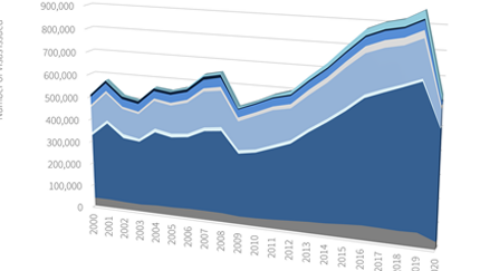Research and Analysis

Untying the Knot Series: Unemployment and Immigration
Untying the Knot (Part I of III): The Unemployment and Immigration Disconnect With Congress once again poised to consider comprehensive immigration reform, a key question confronting lawmakers is to what extent immigration and unemployment are related. Opponents of immigration reform frequently argue that immigrants “take” jobs away from many native-born workers, especially during economic hard times. Yet an analysis of data from the U.S. Census Bureau clearly reveals that this is not the case. In fact, there is little apparent relationship between recent immigration and unemployment rates at the regional, state, or county level. Read More

Facts about Farmworkers
AgJOBS is a bipartisan, compromise bill that is the result of years of negotiations among farmworkers, growers, and Members of Congress. Get the facts on Farmworkers. Read More

Immigration Reform Cited as an Economic Necessity and a Net Gain
The Immigration Policy Center (IPC) has culled the words of leading economists and numerous experts who agree that immigration reform is an economic necessity and a net gain to the U.S. economy. Read More

What Immigration Reform Could Mean for the U.S. Economy
Now more than ever, Americans are seeking real solutions to our nation’s problems, and there is no better place to start than protecting our workers, raising wages, and getting our economy moving again. Part of this massive effort must include workable answers to our critically important immigration problems. Read More

Employment-Based Visa Categories in the United States
Current U.S. immigration law provides several paths for foreign workers to enter the United States for employment purposes on a temporary or permanent basis. This fact sheet provides basic information about how the employment-based U.S. immigration system works. Read More

A Stimulus for Fear: Anti-Immigration Groups Raise Specter of Undocumented Construction Workers and Call for Ensnaring All U.S. Workers in
The Center for Immigration Studies (CIS), as well as the Heritage Foundation, have recently claimed that up to 300,000 construction jobs created by the economic stimulus bill could be filled by undocumented immigrants. CIS arrives at this scary number by using a job-creation formula designed for highway expenditures in 2007, and then tacking on an estimate of the undocumented construction workforce from 2005—before the mass layoffs that have plagued the construction industry. Beyond the use of fuzzy math, CIS also suggests that the federal government’s “E-Verify” employment-verification pilot program could prevent undocumented immigrants from securing these new jobs. Yet numerous reports—from the Congressional Budget Office, the Social Security Administration’s Inspector General, and a Department of Homeland Security contractor, among others—indicate that rushing to implement E-Verify on a national scale would be a costly mistake that would ensnare U.S. citizens in database errors and wouldn’t actually stop undocumented immigrants from getting jobs. “Enforcement-only” attempts to stop undocumented immigration have failed repeatedly for more than 20 years. Only a comprehensive approach to immigration reform that allows exploited undocumented immigrants to become legal workers will fix our broken immigration system in a way that benefits all workers. Read More

How Expanding E-Verify in the Stimulus Bill Would Hurt American Workers and Business
Expanding mandatory E-Verify as part of the stimulus package would threaten the jobs of thousands of U.S. citizens, decrease productivity, saddle U.S. businesses with additional costs, and hinder the Social Security Administration’s (SSA) ability to provide benefits to needy and deserving Americans – all at a time when we need to stimulate our economy. The fact is: expanding E-Verify now would decelerate the Stimulus Package and slow America’s economic recovery. Read More

The High Price of Being “America’s Toughest Sheriff”: Crime and Spending Soar in Maricopa County
Over the past year and a half, Maricopa County Sheriff Joe Arpaio of Arizona has transformed his police department into an immigration-enforcement agency, gaining international publicity in the process. Yet a growing number of elected officials, media outlets, and religious and civic leaders have criticized Sheriff Arpaio’s tactics and their impact on his community. In addition, two independent reports by the East Valley Tribune and the Goldwater Institute describe a Sheriff’s department where crime-solving is down and racial profiling and budget expenditures are way up. Read More

The New Electoral Landscape and What It Means for Immigration Reform
IPC has compiled this one-stop analysis of all the available data on the Asian, Latino and New American vote and shows how and why they voted the way they did in the 2008 election cycle. The report features a variety of early, exit and election-day polling which tells the story of not only a record rate turnout, but also provides insight into the greatest areas of concern for these voters. It also explores early signals from the new administration and congress with respect to immigration reform. The 2008 elections clearly demonstrated the growing power of the Latino, Asian, and immigrant vote. Not only did these groups turn out in record numbers, they also overwhelmingly rejected anti-immigrant politicians who attempted to use immigration as a wedge issue through hateful campaign rhetoric that is quickly becoming an unhealthy trademark of the Republican Party. The following report illustrates the growing electoral clout of Latinos, Asians, and New Americans; provides data on how and why they voted; and demonstrates that immigration was an issue that motivated them to the polls. Election results from races in which immigration was a hot issue show that immigrant-bashing did not work as a campaign strategy. The report also provides evidence that a majority of all voters favor comprehensive immigration reform, and details early signs from the incoming administration and Congress that point to a new direction in immigration policy. Politicians of all stripes would be wise to listen to the voices of ethnic and New American voters and not take them for granted. The analysis provided in the following pages points to the strength and growth of what may be the most important voting bloc in 21st century politics—one that now has the power profoundly to change American elections in the years to come. Read More

Did My Family Really Come “Legally”?
Many people assume that their family immigrated to the United States legally, or did it “the right way.” In most cases, this statement does not reflect the fact that the U.S. immigration system was very different in the past and that their families might not have been allowed to enter had today’s laws been in effect. Read More
Make a contribution
Make a direct impact on the lives of immigrants.
